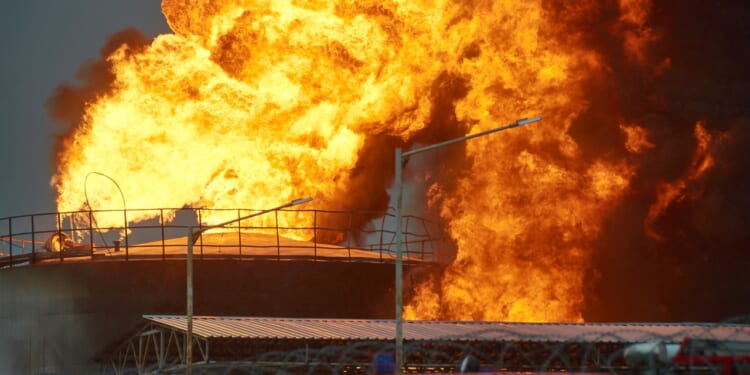Though the attack is unlikely to make a difference in the broader Ukraine War—and could invite the Kremlin’s wrath on Kyiv—it is a demonstration of Ukraine’s changing war strategy.
The Ukraine War continues proving to be that insuperable, gangrenous wound upon the international body politic that risks spreading its contagion beyond Eastern Europe. As the Trump administration mulls handing over Tomahawk cruise missiles to the Ukrainians for them to hit targets deeper within neighboring Russia, against whom Ukraine is warring, Kyiv’s forces conducted a devastating drone attack against a Russian oil terminal known as Tuapse recently.
Russian regional authorities reported that two foreign civilian vessels were damaged in the strike at the port of Tuapse, located on Russia’s southern Black Sea coast. The damage also included port infrastructure and oil-loading equipment at the terminal. Russian authorities have not yet confirmed if there were any casualties. It is believed that several oil-tanker-standers/loaders at the port were disabled.
Why Did Ukraine Attack Tuapse?
Ukraine chose the terminal to attack because it was operated by Russia’s largest state-owned energy firm, Rosneft. Tuapse has massive export capacity and processes large volumes of oil—roughly 240,000 barrels per day, according to gCaptain—for regional export. There has been no word from Russian authorities as to whether operations at Tuapse have been halted altogether or merely diminished for a time.
The port of Tuapse is a key Russian Black Sea oil export terminal and hosts a larger refinery complex. Ukraine’s targeting of this sensitive facility aligns with Kyiv’s broader strategy to hit critical Russian oil infrastructure to weaken Moscow’s war-economy resource base. The fact that foreign civilian vessels were hit may increase international interest or diplomatic fallout, since non-military ships and infrastructure were involved.
But let’s get real. This was always Ukraine’s desire: to impose costs on both the Russians themselves for daring to wage war against Ukraine and against any foreign company or country that would dare to transport Russian energy supplies, which are heavily sanctioned.
Ukraine’s New Strategy Is to Punish Russia Economically
In fact, given the aggressive rhetoric out of the Trump administration toward nations—such as India—that dare to trade in sanctioned Russian energy sources, it is conceivable that Ukraine may have had implicit backing from the Americans and their NATO partners in Europe (never mind that Europe remains one of the largest indirect beneficiaries of cheap Russian energy sources, which they often purchase from third parties, like India).
What’s more, by targeting those civilian vessels, it will further complicate the Russians’ ability to move their sanctioned energy globally to sustain their war economy. After all, one of the world’s largest ship insurers, Lloyd’s of London, will be forced to increase their insurance costs on any company or country whose ships are doing business with Russian oil ports that are being targeted by Ukrainian drones, since the risk to those ships will only increase.
One should also be aware that, in Ukraine’s desperation to continue fighting Russia, Kyiv has taken an unorthodox strategic approach to the matter. By targeting a key component of Russia’s war economy—their energy distribution—Kyiv hopes to hobble the great, nuclear-armed power away from the battlefield.
The Tuapse Attack Won’t Change the War Dynamics
Given Russia’s size, as well as the expansiveness of Russia’s energy sector, it stands to reason that this pinprick strike on Tuapse, while certainly an irritant for Moscow, will do little to dissuade the Kremlin from continuing their brutal war against Ukraine.
Indeed, the fact that Kyiv is intent on striking deeper inside Russia and against sensitive, civilian targets, just might militate Moscow into dealing far more decisively with Kyiv than it has been.
Ukraine thinks this is the pathway to victory. It is not. It’s the pathway toward ensuring that Russia will never negotiate and will seek the absolute destruction of Ukraine. Kyiv must immediately get off this self-destructive course action before negotiations become impossible and Russia’s war machine marches on Kyiv.
About the Author: Brandon J. Weichert
Brandon J. Weichert is a senior national security editor at The National Interest. Recently, Weichert became the host of The National Security Hour on America Outloud News and iHeartRadio, where he discusses national security policy every Wednesday at 8pm Eastern. He is also a contributor at Popular Mechanics and has consulted regularly with various government institutions and private organizations on geopolitical issues. Weichert’s writings have appeared in multiple publications, including The Washington Times, National Review, The American Spectator, MSN, and the Asia Times. His books include Winning Space: How America Remains a Superpower, Biohacked: China’s Race to Control Life, and The Shadow War: Iran’s Quest for Supremacy. His newest book, A Disaster of Our Own Making: How the West Lost Ukraine is available for purchase wherever books are sold. He can be followed via Twitter @WeTheBrandon.
Image: Shutterstock / Dmitriy Sidanchenko.


















